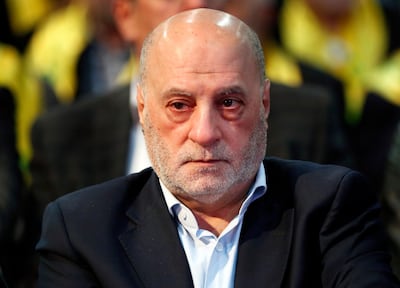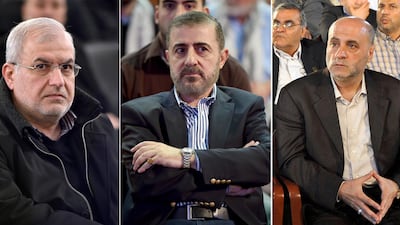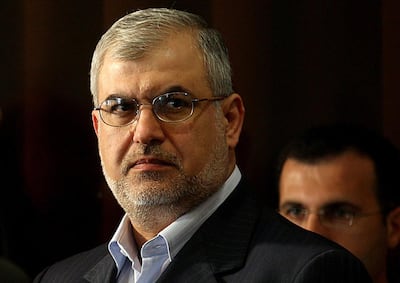The US treasury placed three top Hezbollah officials on a sanctions blacklist on Tuesday, including the Lebanese party's top spy, analysts told The National. The first sanctions on Hezbollah politicians come as a warning to other Lebanese politicians who co-operate with the influential Iran-backed group.
Wafic Safa, Hezbollah’s spymaster
A discrete yet powerful figure, Wafic Safa is a close confidant of Hezbollah leader Hassan Nasrallah.
Mr Safa appears alongside Mr Nasrallah in several pictures and videos broadcast by local media, including a picture of the two young men sitting close together in an informal setting and looking several decades younger, and a picture of them posing with Mr Safa’s three young sons, Mohamed, Hussein, and Ali, in the 2000s.
Born exactly one day after Hezbollah leader Hassan Nasrallah on September 1, 1960, Mr Safa is 59 years old, according to Lebanese TV network Al Jadeed.
In an undated profile of Mr Safa, Al Jadeed reports that Mr Safa became politically active in the 1970s and was close to two influential Shia imams at the time, Mohammad Chamseddine and Musa Sadr, who then disappeared in Libya.
Mr Safa has headed Hezbollah’s security apparatus since 1987 and stepped into the limelight in the mid-1990s when he negotiated the release of Hezbollah prisoners with Israel, who Hezbollah then went on to fight a bloody month-long war against in 2006.
He was a suspect in the assassination of Prime Minister Rafic Hariri, the father of current Prime Minister Saad Hariri, in 2005. Hezbollah has denied its involvement in the Lebanese statesman’s death.
Mr Safa also played a lead role in Hezbollah’s occupation of West Beirut and the Druze-dominated area of Aley in May 2008. “He has wielded illegitimate military force to advance Hezbollah’s interests in Lebanon,” said Firas Maksad, director of the Arabia Foundation, a Washington DC-based think tank.
Today, Mr Safa is Hezbollah’s chief negotiator with other politicians, including Druze leader Walid Joumblatt, who has accused Mr Safa of controlling the country’s state institutions.
"He decides what the (Lebanese) army and security forces can do, and of course, today, he is the one who directs, through Hezbollah's security apparatus, the airport," said Mr Joumblatt in a televised press conference re-broadcast in Al Jadeed's profile of Mr Safa. Contacted by The National, Mr Joumblatt declined to comment on the US treasury's decision.
According to Mr Maksad, Washington’s decision to target Mr Safa came after it became increasingly upset with his role in influencing Lebanese institutions. “Mr Safa is in charge with keeping those institutions in check and within Hezbollah red lines,” he said.
Despite his prominent position, Mr Safa keeps a low profile and rarely speaks to the media.
"He is Hezbollah's spymaster, pulling the strings but without needing to be at the forefront (of its activities)," Lebanese researcher and Hezbollah specialist Lokman Slim told The National.
“He is also a kingmaker: he is the person everybody turns to when there is a government crisis.”
Lebanese politics are regularly marred by political infighting which can delay the formation of a government or the nomination of a president for months or even years.
Amin Sherri, Hezbollah’s Beirut MP

MP Amin Sherri, 62, distinguished himself during the 2018 parliamentary elections by receiving the highest number of votes in Beirut: 22,961, even more than the 20,751 votes that went to Prime Minister Hariri. Hezbollah, traditionally strong in Beirut’s southern suburbs and in South Lebanon, only has one MP in the capital.
Known for his aggressive intimidation tactics, Mr Sherri tried to force his way into a Beirut polling station with several of his supporters on election day on May 6, 2018, in front of journalists and onlookers, but was pushed back by local police.
The US Treasury accuses Mr Sherri of threatening Lebanese bank officials and their family members after an unnamed bank froze accounts of US-designated Hezbollah members.
“US officials describe people like Mr Sherri like thugs rather than legitimate political actors,” said Mr Maksad.
Mr Sherri is a businessman who inherited a company specialised in shoe sales, Mr Slim told The National. He was a Hezbollah activist before being elected MP for the first time in 2005 and is today a member of the health and industry parliamentary commissions.
"He is useful for Hezbollah because he has a working-class background and knows how to appeal to voters as well as play the role of go-between in local disputes," said Waddah Charara, retired sociology professor at the Lebanese University and author of a book on Hezbollah.
The US Treasury published a photograph of Mr Sherri posing with IRGC leader Qasem Soleimani as an element of proof that there exists no distinction between Hezbollah’s political and military activities.
Unlike the US, some entities such as the EU have only designated the military wing of Hezbollah a terrorist organisation. However, Mr Charara pointed out that Mr Soleimani often takes pictures with civilians. “Anywhere he goes in the region, he is surrounded by hundreds of onlookers who ask him to pose for a picture,” he said.
Mohammad Raad, head of the Hezbollah bloc in Parliament
MP Mohammad Raad, 64, has been elected in Parliament since 1992, when the first parliamentary elections were organised after the end of the civil war in 1990. He heads the Hezbollah bloc in parliament.
“By targeting MPs, the US is sending a clear warning to the entire political establishment in Lebanon saying that they could be next, including the president’s Free Patriotic Movement,” Mr Slim told The National.
President Michel Aoun and Hezbollah signed a political alliance in February 2006. A decade later, Mr Aoun became president with Hezbollah's support.
Born in the small town of Jbaa in South Lebanon, Mr Raad was trained as a butcher before becoming politically involved with Shia party Amal, said Mr Charara.
In the 1980s, he left Amal for Hezbollah. Like many other Amal activists, he was encouraged to defect by Hussein Al Musawi, the leader of a pro-Iranian breakoff of Amal called Islamic Amal, according to Mr Charara.
Mr Raad has also been a member of Hezbollah’s Shura Council since 2009, which the US Treasury says “directs Hezbollah units to carry out overseas military and terrorist attacks”.
Mr Raad is a prominent public figure who often visits villages in South Lebanon for local events such as the burial of community leaders, said Mr Charara, who downplayed his importance in Hezbollah’s clandestine operations.
“Hezbollah would not allow strategic members to expose themselves so regularly to the public and thus be vulnerable to kidnapping or assassination attempts.”



